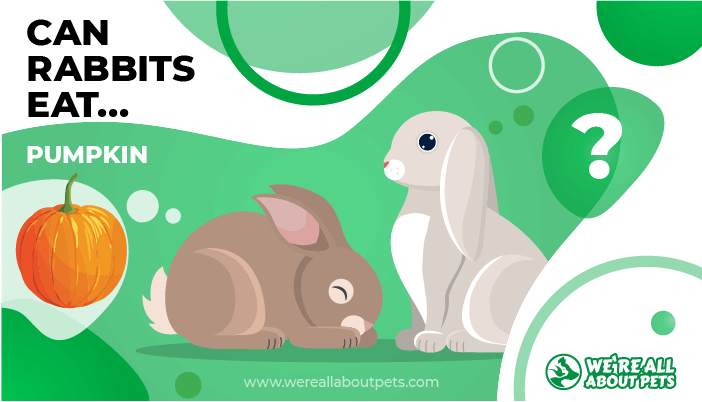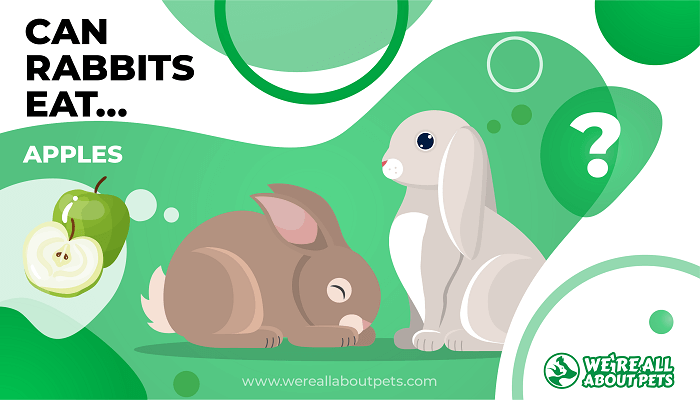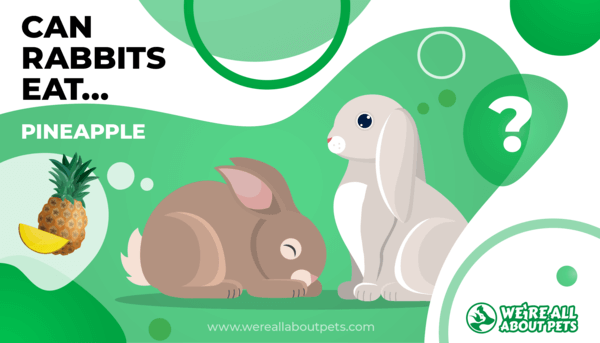Can Rabbits Eat Cabbage?
This page contains affiliate links. We may earn money or products from the companies mentioned in this post through our independently chosen links, which earn us a commission. Learn More
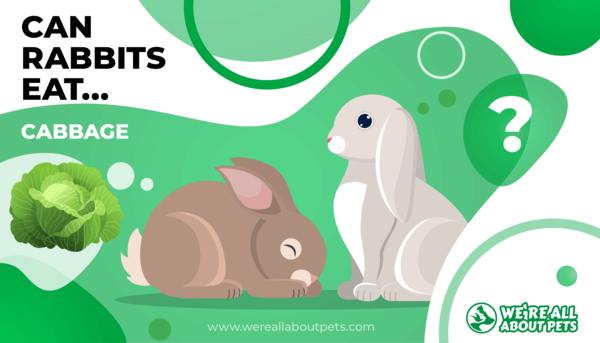
Yummy in cole slaw and tasty in many other dishes as well, cabbage looks like it might be a member of the lettuce family.
The truth is, this nutritious veggie is a closer relative to kale, broccoli, and other cruciferous vegetables!
Curious about whether rabbits can eat cabbage? Wondering how much they should have if they can eat it at all?
We’re here with all the answers, beginning with this one: Yes, rabbits can eat cabbage – in fact, it’s a pretty healthy treat.
Before you run for the refrigerator though, keep reading: There are some important things you need to know about cabbage for rabbits.
Cabbage Nutrition Stats
Cabbage is low in calories, high in fiber, and full of important nutrients!
A one-cup serving of raw cabbage offers:
- 22 calories
- 2 g carbohydrates
- 2 g fiber
- 1 g protein
Cabbage Nutritional Facts

Just like you, bunnies need lots of vitamins and minerals each day – preferably from all-natural sources.
Cabbage is a great source of nutrients, with that same one-cup serving providing approximately:
- 6 mg vitamin C
- 2 iu vitamin A
- 151 mg potassium
- 6 mg calcium
- 7 mg magnesium
- 4 mg iron
- 3 mcg folate
- 1 mg vitamin E
- 6 mcg vitamin K
- 1 mg phosphorus
Can Rabbits Have Cabbage?
Yes! Rabbits can eat cabbage. It’s a nutritious choice whether you offer it as an occasional treat or as part of your rabbit’s regular fresh food rotation.
Is Cabbage Good For Rabbits?
Just as it’s very good for you, cabbage is great for your rabbit. The antioxidants it contains can help keep the body healthy on a cellular level, and the fiber helps keep your bunny’s digestive system moving.
You’ll want to offer the right amount though, since too much can be harmful rather than helpful.
Do Rabbits Like Cabbage?
As you might have guessed, most rabbits really like cabbage. It’s not quite so exciting as other treats but its fresh flavor and satisfying crunch make it a welcome addition to a bunny’s diet.
How Much Cabbage Can A Rabbit Eat?
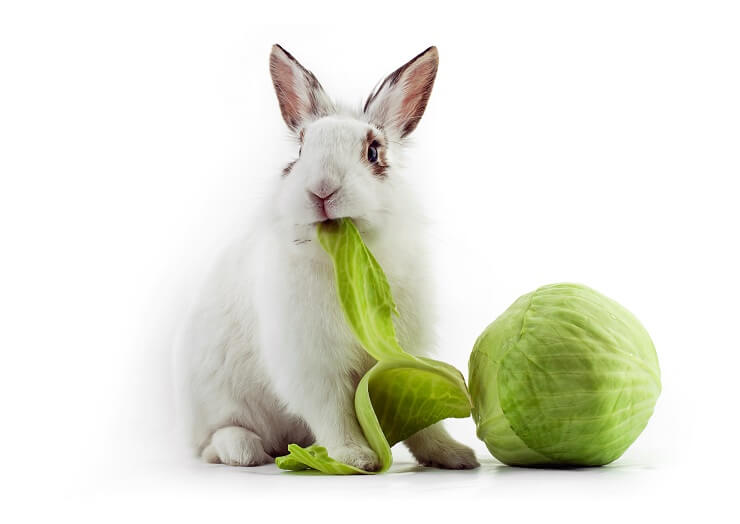
Great question.
There are adorable images everywhere, depicting rabbits popping up out of cabbages and nibbling happily away on large leaves. The truth is that most rabbits should keep their cabbage intake at a fairly moderate level.
Here’s how much cabbage a to feed your rabbit:
| Age | Amount |
| Baby rabbit | None |
| Adult rabbit | 5 cabbage leaves |
Hold on – before you grab all five leaves and feed them to your bunny, remember the rule about introducing new foods gradually. Even though cabbage is among the best natural treats for your rabbit, too much at once can lead to a painful case of bloating.
Rabbits can’t pass gas, so this is something you’ll want to avoid at all costs.
Start by offering a small amount – one small cabbage leaf or half a large one should be plenty for your rabbit’s first taste of cabbage. Over the next 24 hours, watch for signs of bloating or diarrhea.
If everything goes well, you can offer a little more cabbage next time and gradually increase your rabbit’s serving size until they’re eating the full amount. If you notice diarrhea or discomfort, reduce the serving size to keep your rabbit comfortable and healthy.
How Often Can A Rabbit Eat Cabbage?
Because it’s healthy, nutritious, and relatively low in oxalates, cabbage is a veggie rabbits can have almost every day – 4 to 5 days per week should be enough. You do want to rotate their intake through several different fresh foods but this is one they can enjoy often if they like it, and it’s a little easier to keep on hand than some other veggies as it stays fresh in the refrigerator for quite some time.
The Correct Diet is Important
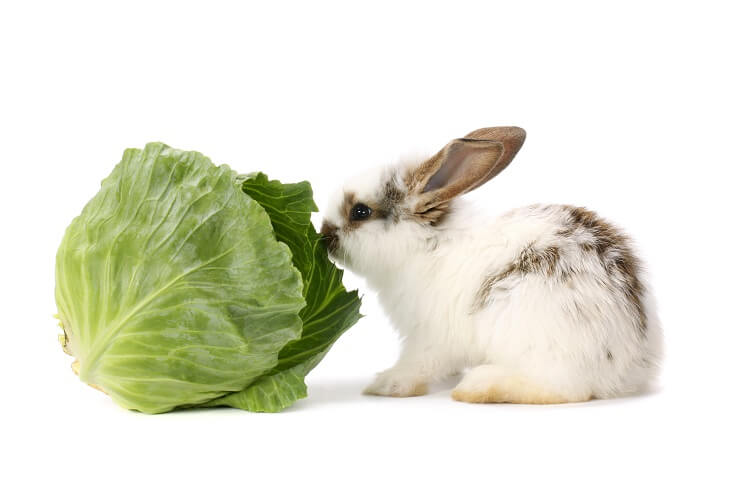
A wild rabbit’s diet consists mainly of items that grow very low to the ground within easy reach, i.e. grasses and herbaceous leafy plants including some brassica species that are closely related to cabbage. Wild berries, vegetables found in gardens, and other plants are occasional treats for a wild bunny.
Since your pet rabbit has the same nutritional needs as their wild cousins, it’s a very good idea to keep their diet as close as possible to what nature intended.
Here’s what you should be feeding your rabbit on a daily basis:
- Timothy, oat, or orchard hay – Fresh hay is a bunny rabbit’s main food source. The fiber keeps your pet’s digestive tract moving and constant nibbling helps prevent your rabbit’s teeth from becoming overgrown. Keep hay available 24/7.
- Age-appropriate rabbit food – Since different brands recommend different serving sizes, it’s important to check the package to see how much rabbit food your bunny should eat every day.
- About a cup of fresh leafy greens per two pounds of your rabbit’s body weight, along with a few crunchy veggies for nibbling.
- Clean, fresh water – be sure to take a moment to rinse and refill your rabbit’s drinking bottle at least once each day. Fresh water needs to be available 24/7.
- Natural treats including fruits and vegetables. Keep fruit intake low; offer no more than about a teaspoon of fruit per two pounds of your rabbit’s body weight.
- About one tablespoon of seeds unless they’re pre-mixed into your rabbit’s food. Pumpkin seeds, unsalted pepitas, and sunflower seeds are some favorites.
Hay cubes, chewable toys, untreated softwood branches, unbleached loofah, and coconut shells aren’t exactly part of a rabbit’s diet, but they’re equally essential for good dental health and habitat enrichment. Your rabbit should have plenty of things to chew at all times.
What Are Other Healthy Alternatives To Cabbage In A Rabbit’s Diet?
Like many small pets, rabbits enjoy a variety of veggies when they can get them!
Here are some veggies rabbits like most:
- carrot
- carrot tops
- beets
- beet tops
- kale
- basil
- spinach
- romaine
- endive
- escarole
- butter lettuce
- rocket
- buttercrunch lettuce
- arugula
- swiss chard
- cucumber
- tomato
- bibb lettuce
- green beans
- pumpkin
- summer squash
- winter squash
- zucchini
- celery
- parsnip
- bell pepper
- broccoli
- broccolini
- watercress
This list contains just a handful of favorites!
The world is full of vegetables that are good for rabbits so it’s easy to keep your bunny healthy and interested in their daily diet. Keep in mind that some foods are toxic to rabbits, and take a few moments to research new items to make sure that they’re safe and find out how much to offer.
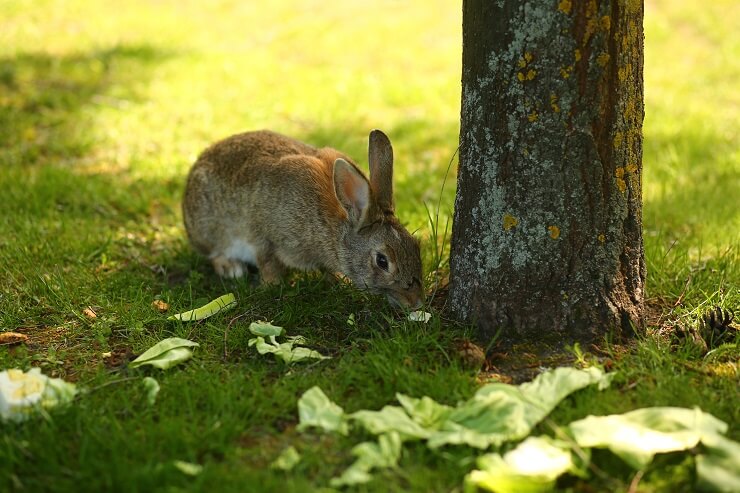
For the time being, giving your rabbit cabbage – either as an occasional treat or as a frequent addition to their daily salad – is a nice way to contribute to good health while making your bunny’s life more enjoyable.
Frequently Asked Questions
Is cabbage safe for rabbits?
Yes! Cabbage is one of the best vegetables for rabbits and once you’ve introduced it to their diet, they can have it several times per week. So long as you give it a good rinse before handing it over, it’s OK to give cabbage to a rabbit.
Can cabbage make my rabbit sick?
It’s possible that cabbage could cause a case of diarrhea if your bunny isn’t accustomed to it, or if your give them too much at once. Like other cruciferous vegetables, cabbage can also cause painful gas and bloating when too much is consumed at one time.
Which types of cabbage can I give my pet rabbit?
Rabbits can eat cabbage of all types: It’s find to offer red cabbage, savoy cabbage, and other varieties that you encounter. Fun fact: bok choy and yu choy are part of the cabbage family – and your rabbit will enjoy them, too!






